Gender Inequality in Hong Kong and Indonesia
VerifiedAdded on 2022/11/26
|15
|2732
|290
AI Summary
This study discusses gender inequality in Hong Kong and Indonesia, including the gender pay gap and the condition of the female workforce. It also explores the importance of gender equality and provides recommendations for strengthening it.
Contribute Materials
Your contribution can guide someone’s learning journey. Share your
documents today.
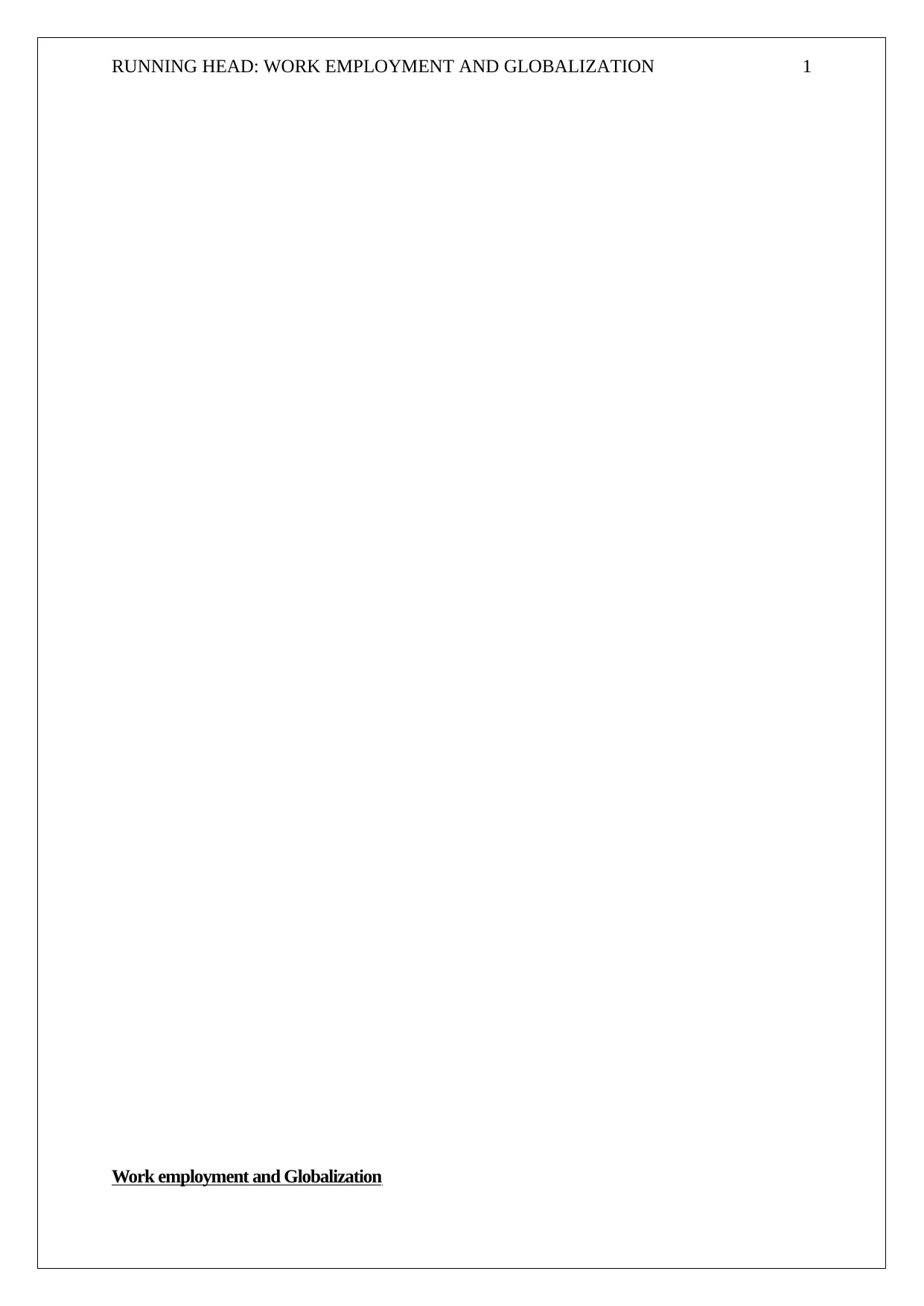
RUNNING HEAD: WORK EMPLOYMENT AND GLOBALIZATION 1
Work employment and Globalization
Work employment and Globalization
Secure Best Marks with AI Grader
Need help grading? Try our AI Grader for instant feedback on your assignments.
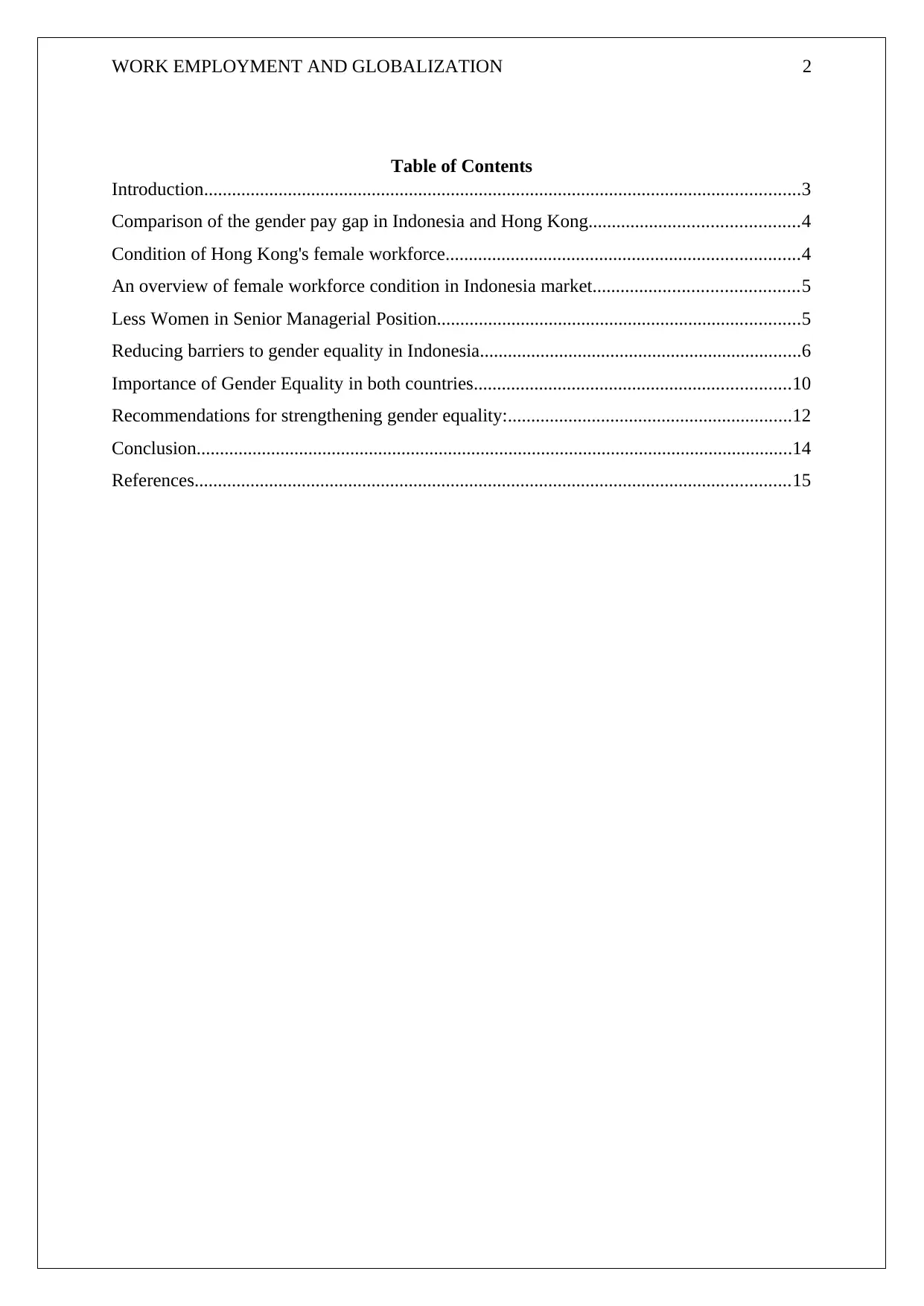
WORK EMPLOYMENT AND GLOBALIZATION 2
Table of Contents
Introduction................................................................................................................................3
Comparison of the gender pay gap in Indonesia and Hong Kong.............................................4
Condition of Hong Kong's female workforce............................................................................4
An overview of female workforce condition in Indonesia market............................................5
Less Women in Senior Managerial Position..............................................................................5
Reducing barriers to gender equality in Indonesia.....................................................................6
Importance of Gender Equality in both countries....................................................................10
Recommendations for strengthening gender equality:.............................................................12
Conclusion................................................................................................................................14
References................................................................................................................................15
Table of Contents
Introduction................................................................................................................................3
Comparison of the gender pay gap in Indonesia and Hong Kong.............................................4
Condition of Hong Kong's female workforce............................................................................4
An overview of female workforce condition in Indonesia market............................................5
Less Women in Senior Managerial Position..............................................................................5
Reducing barriers to gender equality in Indonesia.....................................................................6
Importance of Gender Equality in both countries....................................................................10
Recommendations for strengthening gender equality:.............................................................12
Conclusion................................................................................................................................14
References................................................................................................................................15
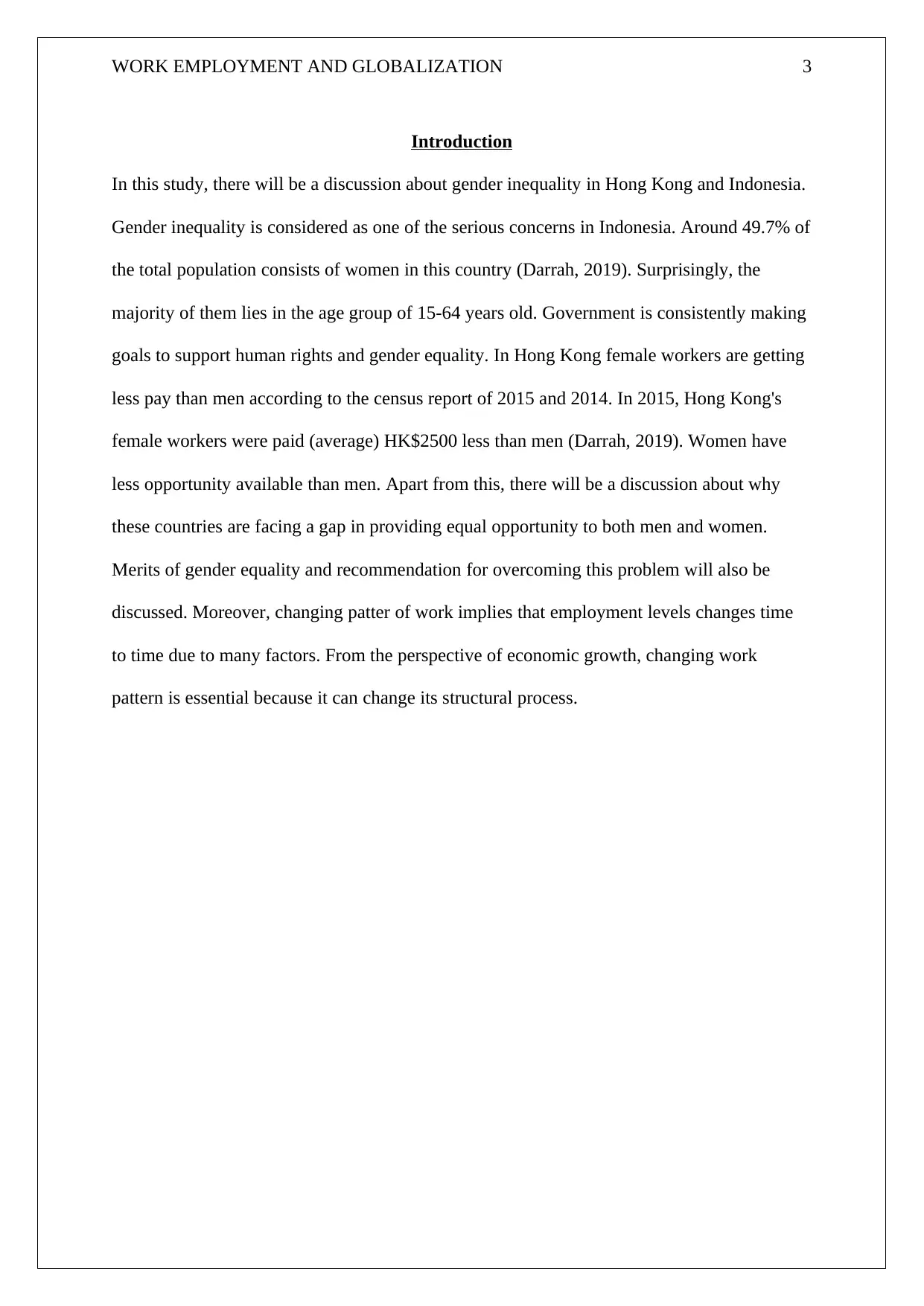
WORK EMPLOYMENT AND GLOBALIZATION 3
Introduction
In this study, there will be a discussion about gender inequality in Hong Kong and Indonesia.
Gender inequality is considered as one of the serious concerns in Indonesia. Around 49.7% of
the total population consists of women in this country (Darrah, 2019). Surprisingly, the
majority of them lies in the age group of 15-64 years old. Government is consistently making
goals to support human rights and gender equality. In Hong Kong female workers are getting
less pay than men according to the census report of 2015 and 2014. In 2015, Hong Kong's
female workers were paid (average) HK$2500 less than men (Darrah, 2019). Women have
less opportunity available than men. Apart from this, there will be a discussion about why
these countries are facing a gap in providing equal opportunity to both men and women.
Merits of gender equality and recommendation for overcoming this problem will also be
discussed. Moreover, changing patter of work implies that employment levels changes time
to time due to many factors. From the perspective of economic growth, changing work
pattern is essential because it can change its structural process.
Introduction
In this study, there will be a discussion about gender inequality in Hong Kong and Indonesia.
Gender inequality is considered as one of the serious concerns in Indonesia. Around 49.7% of
the total population consists of women in this country (Darrah, 2019). Surprisingly, the
majority of them lies in the age group of 15-64 years old. Government is consistently making
goals to support human rights and gender equality. In Hong Kong female workers are getting
less pay than men according to the census report of 2015 and 2014. In 2015, Hong Kong's
female workers were paid (average) HK$2500 less than men (Darrah, 2019). Women have
less opportunity available than men. Apart from this, there will be a discussion about why
these countries are facing a gap in providing equal opportunity to both men and women.
Merits of gender equality and recommendation for overcoming this problem will also be
discussed. Moreover, changing patter of work implies that employment levels changes time
to time due to many factors. From the perspective of economic growth, changing work
pattern is essential because it can change its structural process.
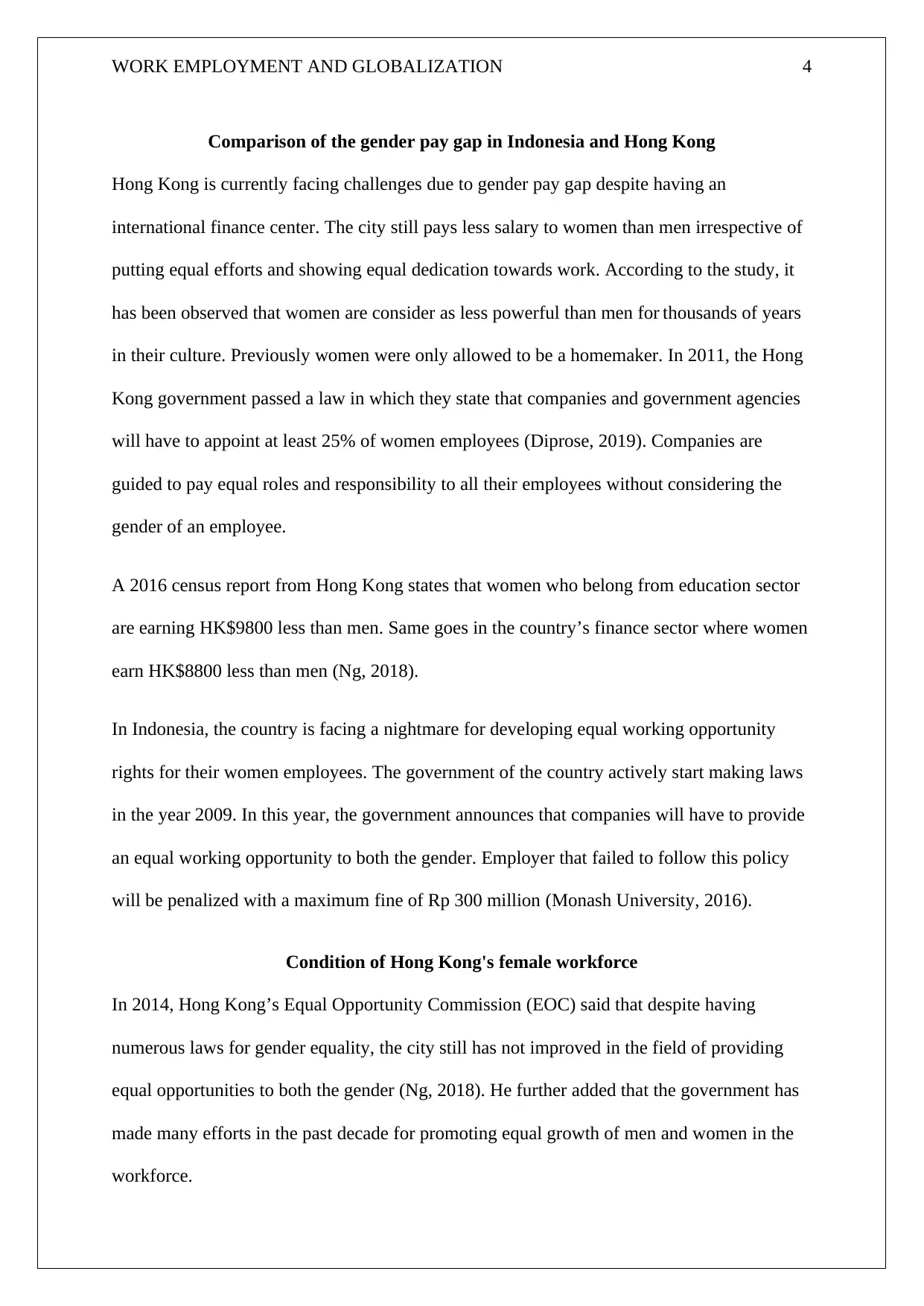
WORK EMPLOYMENT AND GLOBALIZATION 4
Comparison of the gender pay gap in Indonesia and Hong Kong
Hong Kong is currently facing challenges due to gender pay gap despite having an
international finance center. The city still pays less salary to women than men irrespective of
putting equal efforts and showing equal dedication towards work. According to the study, it
has been observed that women are consider as less powerful than men for thousands of years
in their culture. Previously women were only allowed to be a homemaker. In 2011, the Hong
Kong government passed a law in which they state that companies and government agencies
will have to appoint at least 25% of women employees (Diprose, 2019). Companies are
guided to pay equal roles and responsibility to all their employees without considering the
gender of an employee.
A 2016 census report from Hong Kong states that women who belong from education sector
are earning HK$9800 less than men. Same goes in the country’s finance sector where women
earn HK$8800 less than men (Ng, 2018).
In Indonesia, the country is facing a nightmare for developing equal working opportunity
rights for their women employees. The government of the country actively start making laws
in the year 2009. In this year, the government announces that companies will have to provide
an equal working opportunity to both the gender. Employer that failed to follow this policy
will be penalized with a maximum fine of Rp 300 million (Monash University, 2016).
Condition of Hong Kong's female workforce
In 2014, Hong Kong’s Equal Opportunity Commission (EOC) said that despite having
numerous laws for gender equality, the city still has not improved in the field of providing
equal opportunities to both the gender (Ng, 2018). He further added that the government has
made many efforts in the past decade for promoting equal growth of men and women in the
workforce.
Comparison of the gender pay gap in Indonesia and Hong Kong
Hong Kong is currently facing challenges due to gender pay gap despite having an
international finance center. The city still pays less salary to women than men irrespective of
putting equal efforts and showing equal dedication towards work. According to the study, it
has been observed that women are consider as less powerful than men for thousands of years
in their culture. Previously women were only allowed to be a homemaker. In 2011, the Hong
Kong government passed a law in which they state that companies and government agencies
will have to appoint at least 25% of women employees (Diprose, 2019). Companies are
guided to pay equal roles and responsibility to all their employees without considering the
gender of an employee.
A 2016 census report from Hong Kong states that women who belong from education sector
are earning HK$9800 less than men. Same goes in the country’s finance sector where women
earn HK$8800 less than men (Ng, 2018).
In Indonesia, the country is facing a nightmare for developing equal working opportunity
rights for their women employees. The government of the country actively start making laws
in the year 2009. In this year, the government announces that companies will have to provide
an equal working opportunity to both the gender. Employer that failed to follow this policy
will be penalized with a maximum fine of Rp 300 million (Monash University, 2016).
Condition of Hong Kong's female workforce
In 2014, Hong Kong’s Equal Opportunity Commission (EOC) said that despite having
numerous laws for gender equality, the city still has not improved in the field of providing
equal opportunities to both the gender (Ng, 2018). He further added that the government has
made many efforts in the past decade for promoting equal growth of men and women in the
workforce.
Secure Best Marks with AI Grader
Need help grading? Try our AI Grader for instant feedback on your assignments.
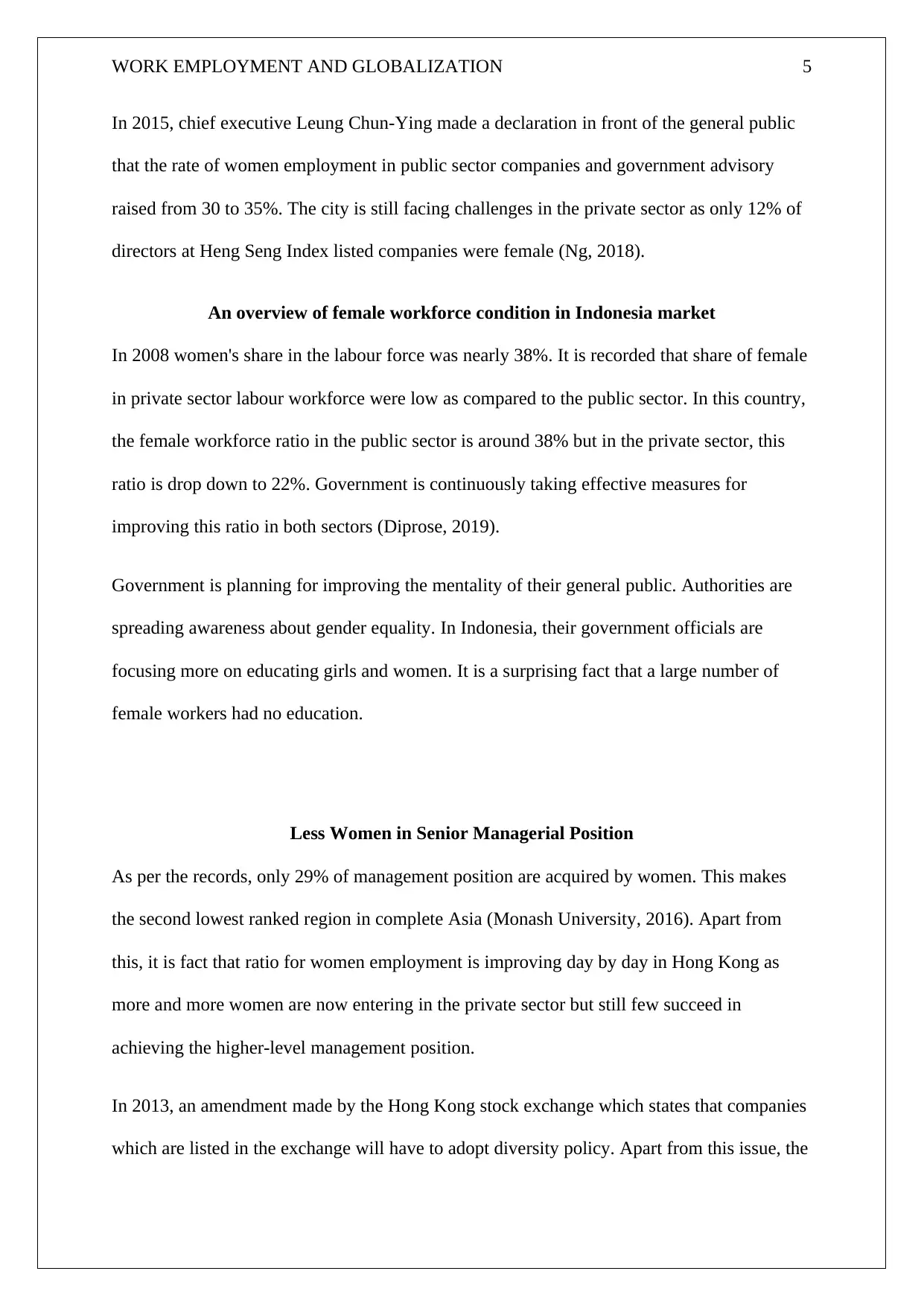
WORK EMPLOYMENT AND GLOBALIZATION 5
In 2015, chief executive Leung Chun-Ying made a declaration in front of the general public
that the rate of women employment in public sector companies and government advisory
raised from 30 to 35%. The city is still facing challenges in the private sector as only 12% of
directors at Heng Seng Index listed companies were female (Ng, 2018).
An overview of female workforce condition in Indonesia market
In 2008 women's share in the labour force was nearly 38%. It is recorded that share of female
in private sector labour workforce were low as compared to the public sector. In this country,
the female workforce ratio in the public sector is around 38% but in the private sector, this
ratio is drop down to 22%. Government is continuously taking effective measures for
improving this ratio in both sectors (Diprose, 2019).
Government is planning for improving the mentality of their general public. Authorities are
spreading awareness about gender equality. In Indonesia, their government officials are
focusing more on educating girls and women. It is a surprising fact that a large number of
female workers had no education.
Less Women in Senior Managerial Position
As per the records, only 29% of management position are acquired by women. This makes
the second lowest ranked region in complete Asia (Monash University, 2016). Apart from
this, it is fact that ratio for women employment is improving day by day in Hong Kong as
more and more women are now entering in the private sector but still few succeed in
achieving the higher-level management position.
In 2013, an amendment made by the Hong Kong stock exchange which states that companies
which are listed in the exchange will have to adopt diversity policy. Apart from this issue, the
In 2015, chief executive Leung Chun-Ying made a declaration in front of the general public
that the rate of women employment in public sector companies and government advisory
raised from 30 to 35%. The city is still facing challenges in the private sector as only 12% of
directors at Heng Seng Index listed companies were female (Ng, 2018).
An overview of female workforce condition in Indonesia market
In 2008 women's share in the labour force was nearly 38%. It is recorded that share of female
in private sector labour workforce were low as compared to the public sector. In this country,
the female workforce ratio in the public sector is around 38% but in the private sector, this
ratio is drop down to 22%. Government is continuously taking effective measures for
improving this ratio in both sectors (Diprose, 2019).
Government is planning for improving the mentality of their general public. Authorities are
spreading awareness about gender equality. In Indonesia, their government officials are
focusing more on educating girls and women. It is a surprising fact that a large number of
female workers had no education.
Less Women in Senior Managerial Position
As per the records, only 29% of management position are acquired by women. This makes
the second lowest ranked region in complete Asia (Monash University, 2016). Apart from
this, it is fact that ratio for women employment is improving day by day in Hong Kong as
more and more women are now entering in the private sector but still few succeed in
achieving the higher-level management position.
In 2013, an amendment made by the Hong Kong stock exchange which states that companies
which are listed in the exchange will have to adopt diversity policy. Apart from this issue, the
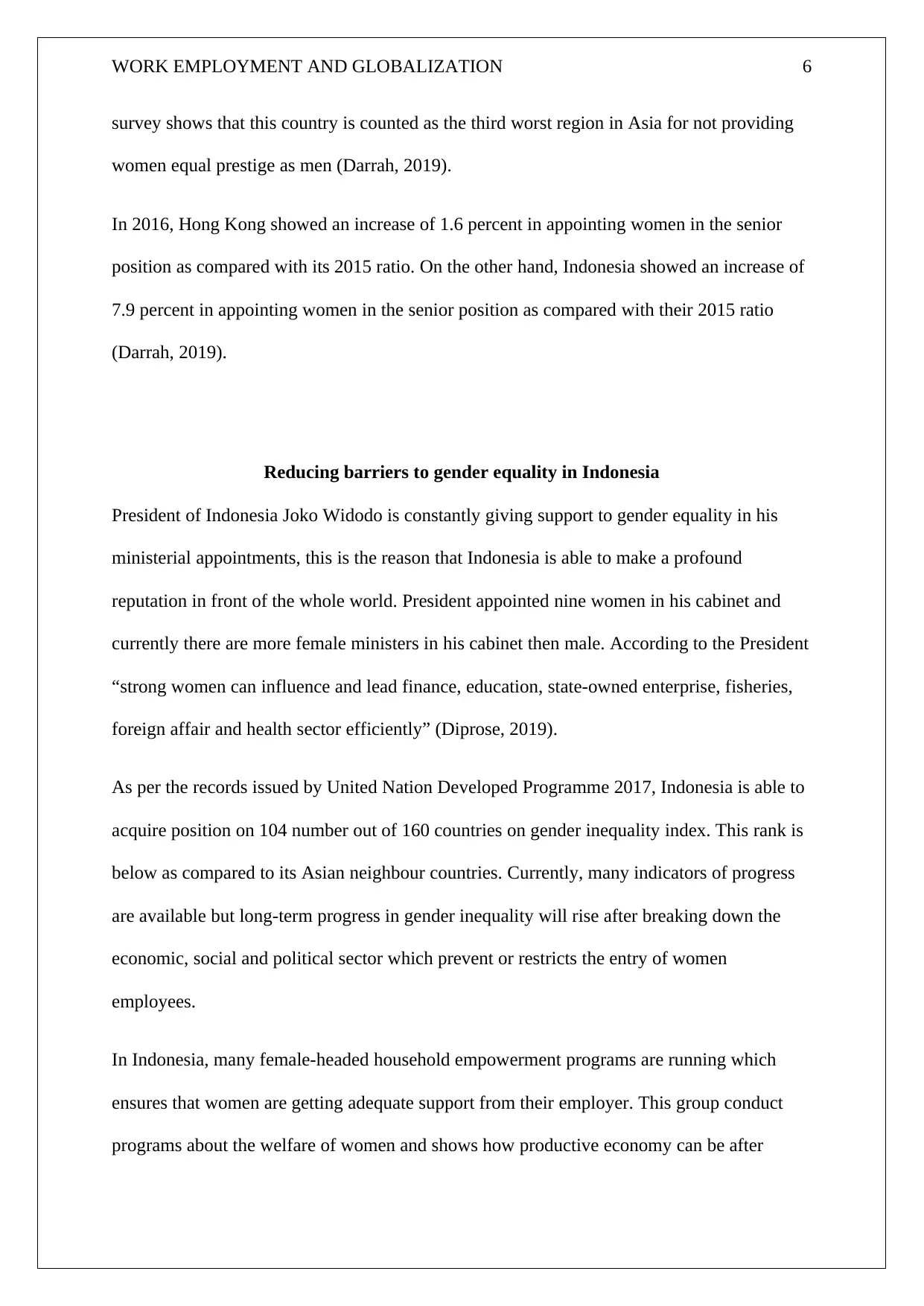
WORK EMPLOYMENT AND GLOBALIZATION 6
survey shows that this country is counted as the third worst region in Asia for not providing
women equal prestige as men (Darrah, 2019).
In 2016, Hong Kong showed an increase of 1.6 percent in appointing women in the senior
position as compared with its 2015 ratio. On the other hand, Indonesia showed an increase of
7.9 percent in appointing women in the senior position as compared with their 2015 ratio
(Darrah, 2019).
Reducing barriers to gender equality in Indonesia
President of Indonesia Joko Widodo is constantly giving support to gender equality in his
ministerial appointments, this is the reason that Indonesia is able to make a profound
reputation in front of the whole world. President appointed nine women in his cabinet and
currently there are more female ministers in his cabinet then male. According to the President
“strong women can influence and lead finance, education, state-owned enterprise, fisheries,
foreign affair and health sector efficiently” (Diprose, 2019).
As per the records issued by United Nation Developed Programme 2017, Indonesia is able to
acquire position on 104 number out of 160 countries on gender inequality index. This rank is
below as compared to its Asian neighbour countries. Currently, many indicators of progress
are available but long-term progress in gender inequality will rise after breaking down the
economic, social and political sector which prevent or restricts the entry of women
employees.
In Indonesia, many female-headed household empowerment programs are running which
ensures that women are getting adequate support from their employer. This group conduct
programs about the welfare of women and shows how productive economy can be after
survey shows that this country is counted as the third worst region in Asia for not providing
women equal prestige as men (Darrah, 2019).
In 2016, Hong Kong showed an increase of 1.6 percent in appointing women in the senior
position as compared with its 2015 ratio. On the other hand, Indonesia showed an increase of
7.9 percent in appointing women in the senior position as compared with their 2015 ratio
(Darrah, 2019).
Reducing barriers to gender equality in Indonesia
President of Indonesia Joko Widodo is constantly giving support to gender equality in his
ministerial appointments, this is the reason that Indonesia is able to make a profound
reputation in front of the whole world. President appointed nine women in his cabinet and
currently there are more female ministers in his cabinet then male. According to the President
“strong women can influence and lead finance, education, state-owned enterprise, fisheries,
foreign affair and health sector efficiently” (Diprose, 2019).
As per the records issued by United Nation Developed Programme 2017, Indonesia is able to
acquire position on 104 number out of 160 countries on gender inequality index. This rank is
below as compared to its Asian neighbour countries. Currently, many indicators of progress
are available but long-term progress in gender inequality will rise after breaking down the
economic, social and political sector which prevent or restricts the entry of women
employees.
In Indonesia, many female-headed household empowerment programs are running which
ensures that women are getting adequate support from their employer. This group conduct
programs about the welfare of women and shows how productive economy can be after
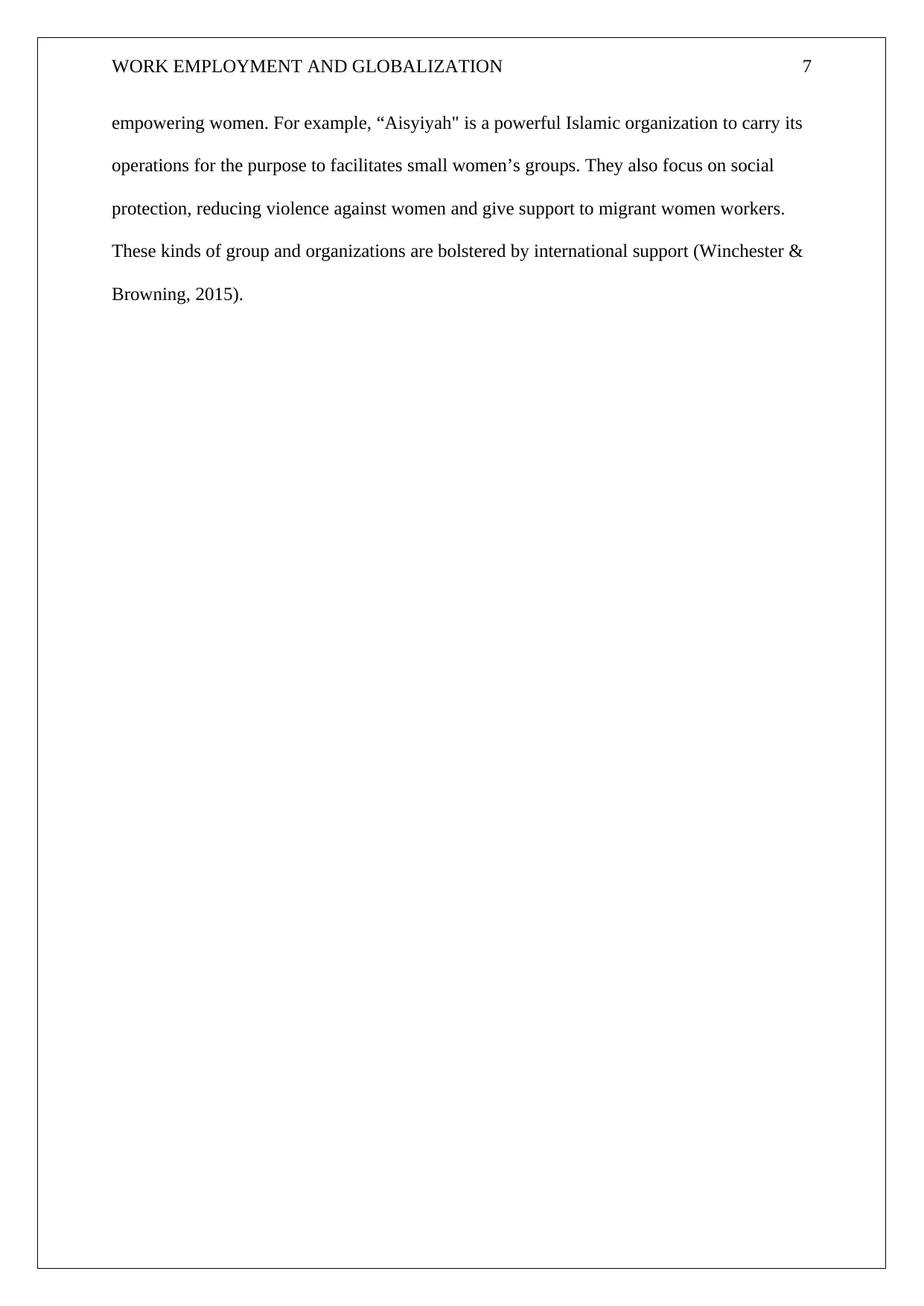
WORK EMPLOYMENT AND GLOBALIZATION 7
empowering women. For example, “Aisyiyah" is a powerful Islamic organization to carry its
operations for the purpose to facilitates small women’s groups. They also focus on social
protection, reducing violence against women and give support to migrant women workers.
These kinds of group and organizations are bolstered by international support (Winchester &
Browning, 2015).
empowering women. For example, “Aisyiyah" is a powerful Islamic organization to carry its
operations for the purpose to facilitates small women’s groups. They also focus on social
protection, reducing violence against women and give support to migrant women workers.
These kinds of group and organizations are bolstered by international support (Winchester &
Browning, 2015).
Paraphrase This Document
Need a fresh take? Get an instant paraphrase of this document with our AI Paraphraser
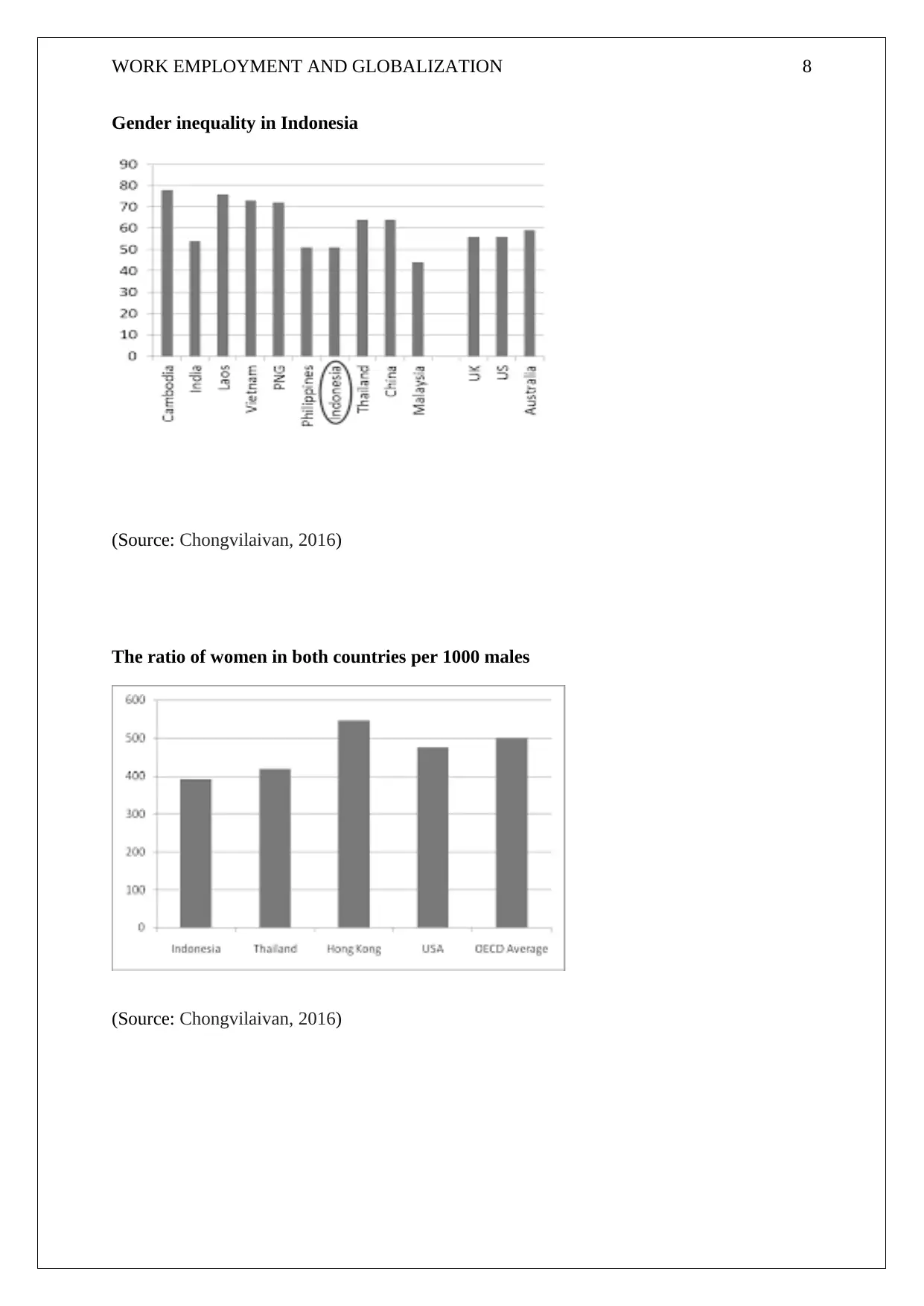
WORK EMPLOYMENT AND GLOBALIZATION 8
Gender inequality in Indonesia
(Source: Chongvilaivan, 2016)
The ratio of women in both countries per 1000 males
(Source: Chongvilaivan, 2016)
Gender inequality in Indonesia
(Source: Chongvilaivan, 2016)
The ratio of women in both countries per 1000 males
(Source: Chongvilaivan, 2016)
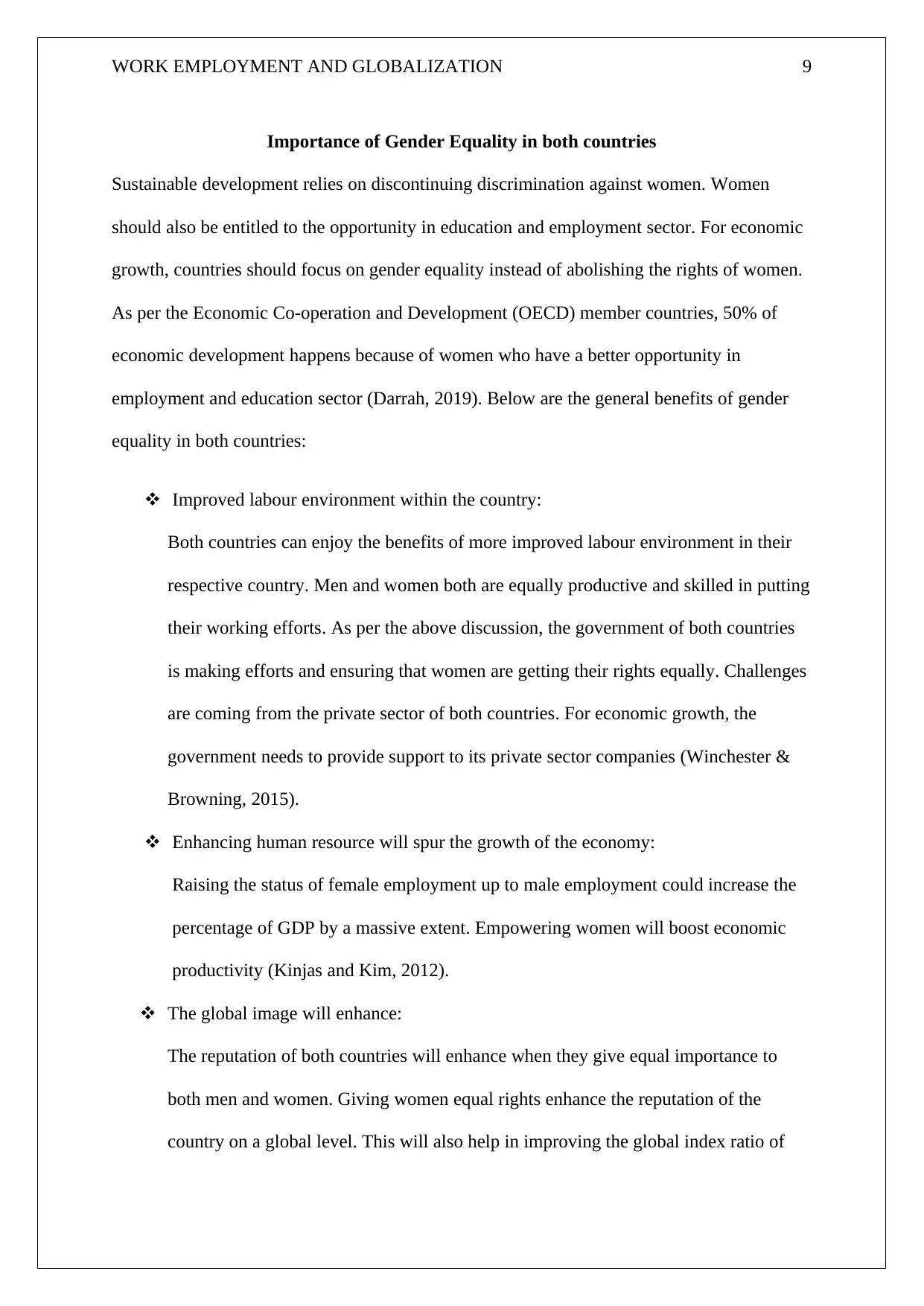
WORK EMPLOYMENT AND GLOBALIZATION 9
Importance of Gender Equality in both countries
Sustainable development relies on discontinuing discrimination against women. Women
should also be entitled to the opportunity in education and employment sector. For economic
growth, countries should focus on gender equality instead of abolishing the rights of women.
As per the Economic Co-operation and Development (OECD) member countries, 50% of
economic development happens because of women who have a better opportunity in
employment and education sector (Darrah, 2019). Below are the general benefits of gender
equality in both countries:
Improved labour environment within the country:
Both countries can enjoy the benefits of more improved labour environment in their
respective country. Men and women both are equally productive and skilled in putting
their working efforts. As per the above discussion, the government of both countries
is making efforts and ensuring that women are getting their rights equally. Challenges
are coming from the private sector of both countries. For economic growth, the
government needs to provide support to its private sector companies (Winchester &
Browning, 2015).
Enhancing human resource will spur the growth of the economy:
Raising the status of female employment up to male employment could increase the
percentage of GDP by a massive extent. Empowering women will boost economic
productivity (Kinjas and Kim, 2012).
The global image will enhance:
The reputation of both countries will enhance when they give equal importance to
both men and women. Giving women equal rights enhance the reputation of the
country on a global level. This will also help in improving the global index ratio of
Importance of Gender Equality in both countries
Sustainable development relies on discontinuing discrimination against women. Women
should also be entitled to the opportunity in education and employment sector. For economic
growth, countries should focus on gender equality instead of abolishing the rights of women.
As per the Economic Co-operation and Development (OECD) member countries, 50% of
economic development happens because of women who have a better opportunity in
employment and education sector (Darrah, 2019). Below are the general benefits of gender
equality in both countries:
Improved labour environment within the country:
Both countries can enjoy the benefits of more improved labour environment in their
respective country. Men and women both are equally productive and skilled in putting
their working efforts. As per the above discussion, the government of both countries
is making efforts and ensuring that women are getting their rights equally. Challenges
are coming from the private sector of both countries. For economic growth, the
government needs to provide support to its private sector companies (Winchester &
Browning, 2015).
Enhancing human resource will spur the growth of the economy:
Raising the status of female employment up to male employment could increase the
percentage of GDP by a massive extent. Empowering women will boost economic
productivity (Kinjas and Kim, 2012).
The global image will enhance:
The reputation of both countries will enhance when they give equal importance to
both men and women. Giving women equal rights enhance the reputation of the
country on a global level. This will also help in improving the global index ratio of
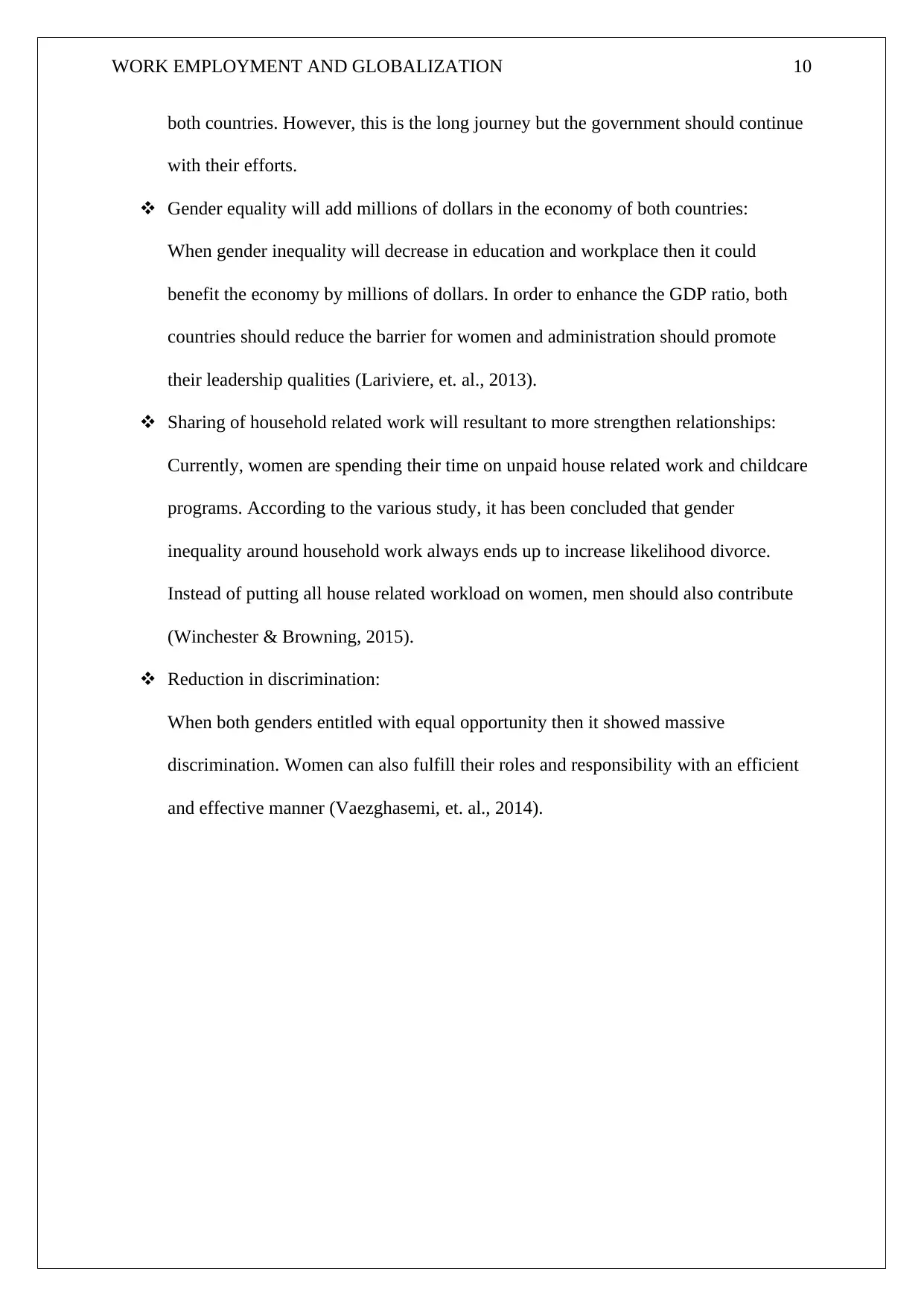
WORK EMPLOYMENT AND GLOBALIZATION 10
both countries. However, this is the long journey but the government should continue
with their efforts.
Gender equality will add millions of dollars in the economy of both countries:
When gender inequality will decrease in education and workplace then it could
benefit the economy by millions of dollars. In order to enhance the GDP ratio, both
countries should reduce the barrier for women and administration should promote
their leadership qualities (Lariviere, et. al., 2013).
Sharing of household related work will resultant to more strengthen relationships:
Currently, women are spending their time on unpaid house related work and childcare
programs. According to the various study, it has been concluded that gender
inequality around household work always ends up to increase likelihood divorce.
Instead of putting all house related workload on women, men should also contribute
(Winchester & Browning, 2015).
Reduction in discrimination:
When both genders entitled with equal opportunity then it showed massive
discrimination. Women can also fulfill their roles and responsibility with an efficient
and effective manner (Vaezghasemi, et. al., 2014).
both countries. However, this is the long journey but the government should continue
with their efforts.
Gender equality will add millions of dollars in the economy of both countries:
When gender inequality will decrease in education and workplace then it could
benefit the economy by millions of dollars. In order to enhance the GDP ratio, both
countries should reduce the barrier for women and administration should promote
their leadership qualities (Lariviere, et. al., 2013).
Sharing of household related work will resultant to more strengthen relationships:
Currently, women are spending their time on unpaid house related work and childcare
programs. According to the various study, it has been concluded that gender
inequality around household work always ends up to increase likelihood divorce.
Instead of putting all house related workload on women, men should also contribute
(Winchester & Browning, 2015).
Reduction in discrimination:
When both genders entitled with equal opportunity then it showed massive
discrimination. Women can also fulfill their roles and responsibility with an efficient
and effective manner (Vaezghasemi, et. al., 2014).
Secure Best Marks with AI Grader
Need help grading? Try our AI Grader for instant feedback on your assignments.
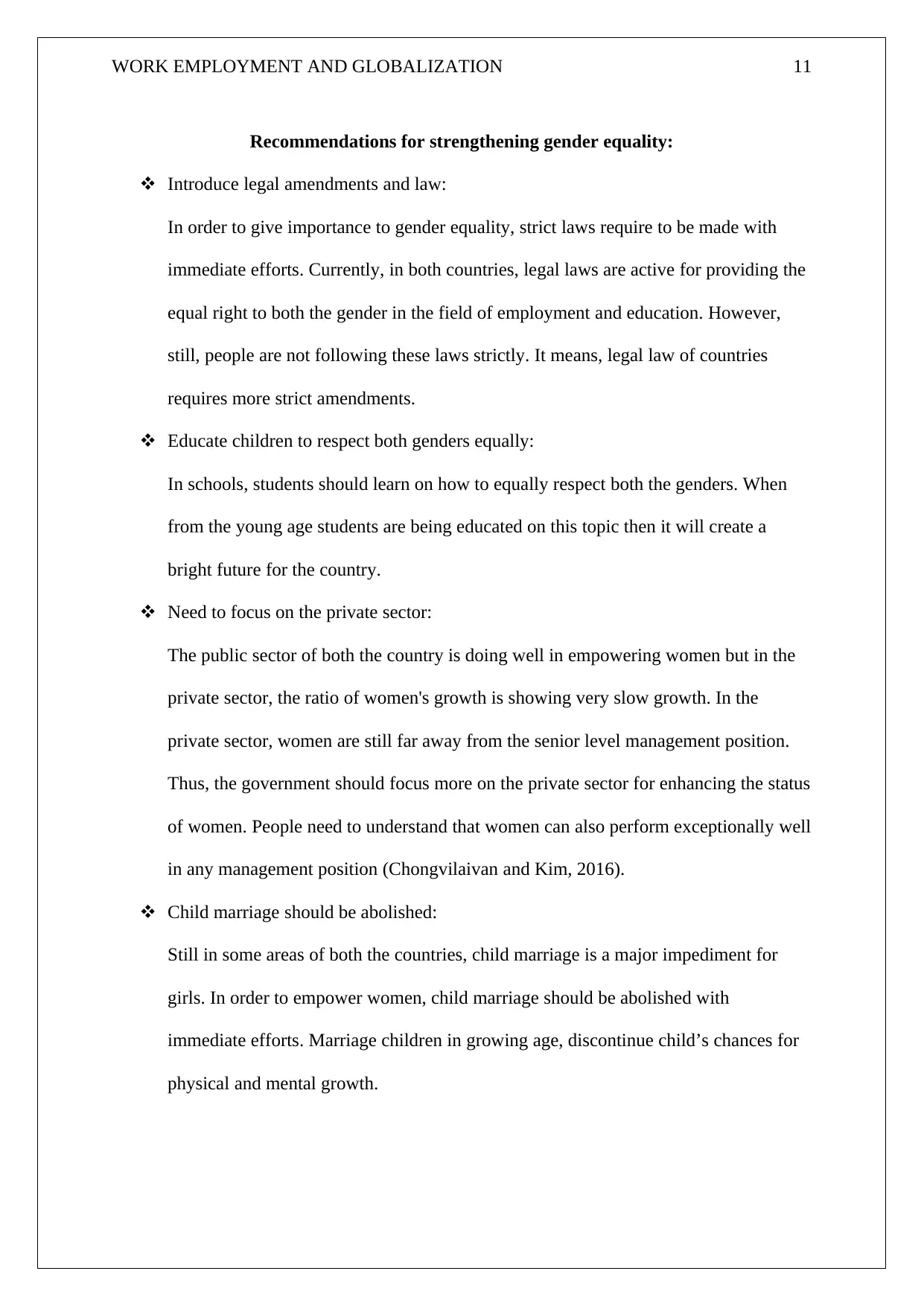
WORK EMPLOYMENT AND GLOBALIZATION 11
Recommendations for strengthening gender equality:
Introduce legal amendments and law:
In order to give importance to gender equality, strict laws require to be made with
immediate efforts. Currently, in both countries, legal laws are active for providing the
equal right to both the gender in the field of employment and education. However,
still, people are not following these laws strictly. It means, legal law of countries
requires more strict amendments.
Educate children to respect both genders equally:
In schools, students should learn on how to equally respect both the genders. When
from the young age students are being educated on this topic then it will create a
bright future for the country.
Need to focus on the private sector:
The public sector of both the country is doing well in empowering women but in the
private sector, the ratio of women's growth is showing very slow growth. In the
private sector, women are still far away from the senior level management position.
Thus, the government should focus more on the private sector for enhancing the status
of women. People need to understand that women can also perform exceptionally well
in any management position (Chongvilaivan and Kim, 2016).
Child marriage should be abolished:
Still in some areas of both the countries, child marriage is a major impediment for
girls. In order to empower women, child marriage should be abolished with
immediate efforts. Marriage children in growing age, discontinue child’s chances for
physical and mental growth.
Recommendations for strengthening gender equality:
Introduce legal amendments and law:
In order to give importance to gender equality, strict laws require to be made with
immediate efforts. Currently, in both countries, legal laws are active for providing the
equal right to both the gender in the field of employment and education. However,
still, people are not following these laws strictly. It means, legal law of countries
requires more strict amendments.
Educate children to respect both genders equally:
In schools, students should learn on how to equally respect both the genders. When
from the young age students are being educated on this topic then it will create a
bright future for the country.
Need to focus on the private sector:
The public sector of both the country is doing well in empowering women but in the
private sector, the ratio of women's growth is showing very slow growth. In the
private sector, women are still far away from the senior level management position.
Thus, the government should focus more on the private sector for enhancing the status
of women. People need to understand that women can also perform exceptionally well
in any management position (Chongvilaivan and Kim, 2016).
Child marriage should be abolished:
Still in some areas of both the countries, child marriage is a major impediment for
girls. In order to empower women, child marriage should be abolished with
immediate efforts. Marriage children in growing age, discontinue child’s chances for
physical and mental growth.
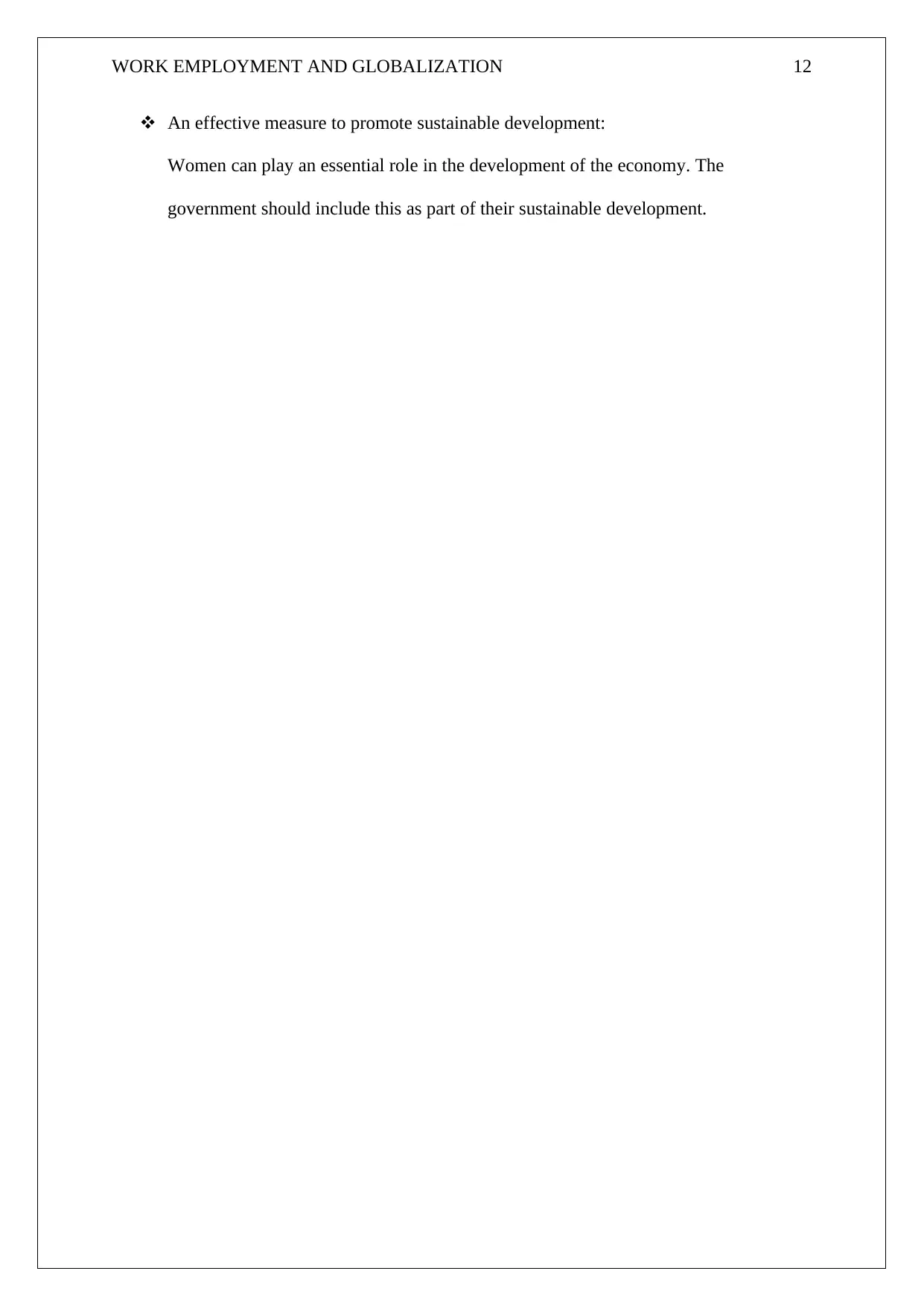
WORK EMPLOYMENT AND GLOBALIZATION 12
An effective measure to promote sustainable development:
Women can play an essential role in the development of the economy. The
government should include this as part of their sustainable development.
An effective measure to promote sustainable development:
Women can play an essential role in the development of the economy. The
government should include this as part of their sustainable development.
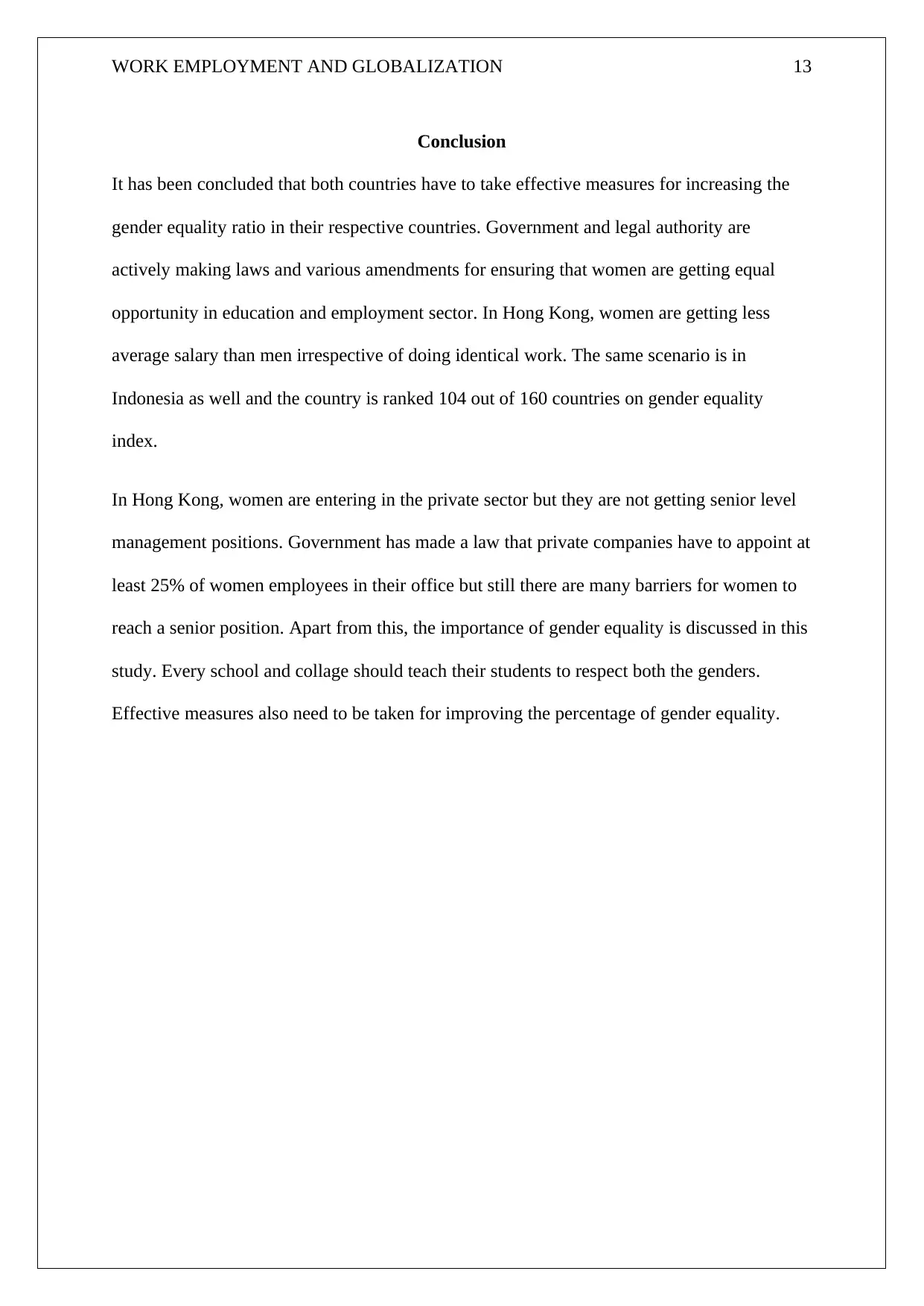
WORK EMPLOYMENT AND GLOBALIZATION 13
Conclusion
It has been concluded that both countries have to take effective measures for increasing the
gender equality ratio in their respective countries. Government and legal authority are
actively making laws and various amendments for ensuring that women are getting equal
opportunity in education and employment sector. In Hong Kong, women are getting less
average salary than men irrespective of doing identical work. The same scenario is in
Indonesia as well and the country is ranked 104 out of 160 countries on gender equality
index.
In Hong Kong, women are entering in the private sector but they are not getting senior level
management positions. Government has made a law that private companies have to appoint at
least 25% of women employees in their office but still there are many barriers for women to
reach a senior position. Apart from this, the importance of gender equality is discussed in this
study. Every school and collage should teach their students to respect both the genders.
Effective measures also need to be taken for improving the percentage of gender equality.
Conclusion
It has been concluded that both countries have to take effective measures for increasing the
gender equality ratio in their respective countries. Government and legal authority are
actively making laws and various amendments for ensuring that women are getting equal
opportunity in education and employment sector. In Hong Kong, women are getting less
average salary than men irrespective of doing identical work. The same scenario is in
Indonesia as well and the country is ranked 104 out of 160 countries on gender equality
index.
In Hong Kong, women are entering in the private sector but they are not getting senior level
management positions. Government has made a law that private companies have to appoint at
least 25% of women employees in their office but still there are many barriers for women to
reach a senior position. Apart from this, the importance of gender equality is discussed in this
study. Every school and collage should teach their students to respect both the genders.
Effective measures also need to be taken for improving the percentage of gender equality.
Paraphrase This Document
Need a fresh take? Get an instant paraphrase of this document with our AI Paraphraser
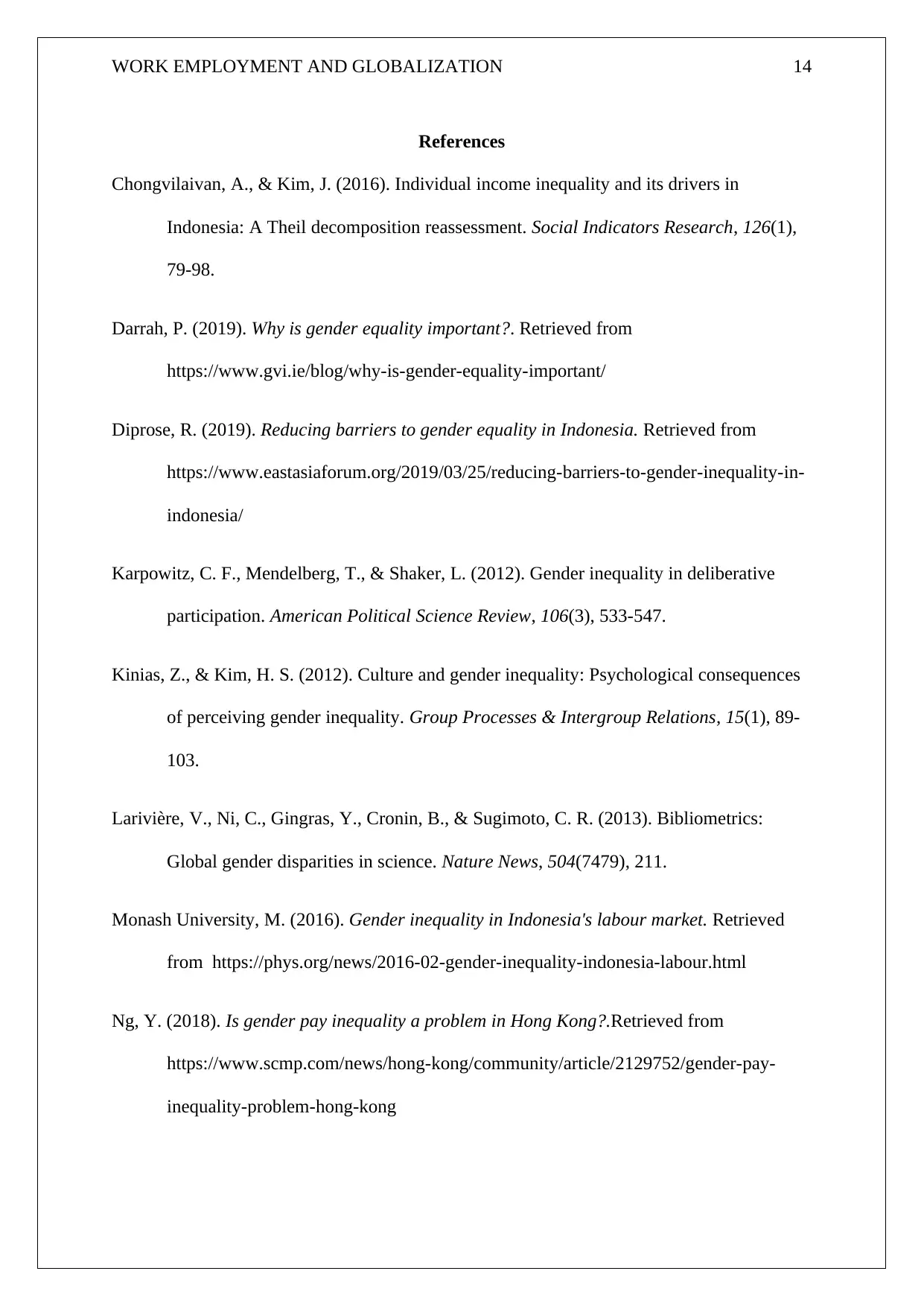
WORK EMPLOYMENT AND GLOBALIZATION 14
References
Chongvilaivan, A., & Kim, J. (2016). Individual income inequality and its drivers in
Indonesia: A Theil decomposition reassessment. Social Indicators Research, 126(1),
79-98.
Darrah, P. (2019). Why is gender equality important?. Retrieved from
https://www.gvi.ie/blog/why-is-gender-equality-important/
Diprose, R. (2019). Reducing barriers to gender equality in Indonesia. Retrieved from
https://www.eastasiaforum.org/2019/03/25/reducing-barriers-to-gender-inequality-in-
indonesia/
Karpowitz, C. F., Mendelberg, T., & Shaker, L. (2012). Gender inequality in deliberative
participation. American Political Science Review, 106(3), 533-547.
Kinias, Z., & Kim, H. S. (2012). Culture and gender inequality: Psychological consequences
of perceiving gender inequality. Group Processes & Intergroup Relations, 15(1), 89-
103.
Larivière, V., Ni, C., Gingras, Y., Cronin, B., & Sugimoto, C. R. (2013). Bibliometrics:
Global gender disparities in science. Nature News, 504(7479), 211.
Monash University, M. (2016). Gender inequality in Indonesia's labour market. Retrieved
from https://phys.org/news/2016-02-gender-inequality-indonesia-labour.html
Ng, Y. (2018). Is gender pay inequality a problem in Hong Kong?.Retrieved from
https://www.scmp.com/news/hong-kong/community/article/2129752/gender-pay-
inequality-problem-hong-kong
References
Chongvilaivan, A., & Kim, J. (2016). Individual income inequality and its drivers in
Indonesia: A Theil decomposition reassessment. Social Indicators Research, 126(1),
79-98.
Darrah, P. (2019). Why is gender equality important?. Retrieved from
https://www.gvi.ie/blog/why-is-gender-equality-important/
Diprose, R. (2019). Reducing barriers to gender equality in Indonesia. Retrieved from
https://www.eastasiaforum.org/2019/03/25/reducing-barriers-to-gender-inequality-in-
indonesia/
Karpowitz, C. F., Mendelberg, T., & Shaker, L. (2012). Gender inequality in deliberative
participation. American Political Science Review, 106(3), 533-547.
Kinias, Z., & Kim, H. S. (2012). Culture and gender inequality: Psychological consequences
of perceiving gender inequality. Group Processes & Intergroup Relations, 15(1), 89-
103.
Larivière, V., Ni, C., Gingras, Y., Cronin, B., & Sugimoto, C. R. (2013). Bibliometrics:
Global gender disparities in science. Nature News, 504(7479), 211.
Monash University, M. (2016). Gender inequality in Indonesia's labour market. Retrieved
from https://phys.org/news/2016-02-gender-inequality-indonesia-labour.html
Ng, Y. (2018). Is gender pay inequality a problem in Hong Kong?.Retrieved from
https://www.scmp.com/news/hong-kong/community/article/2129752/gender-pay-
inequality-problem-hong-kong
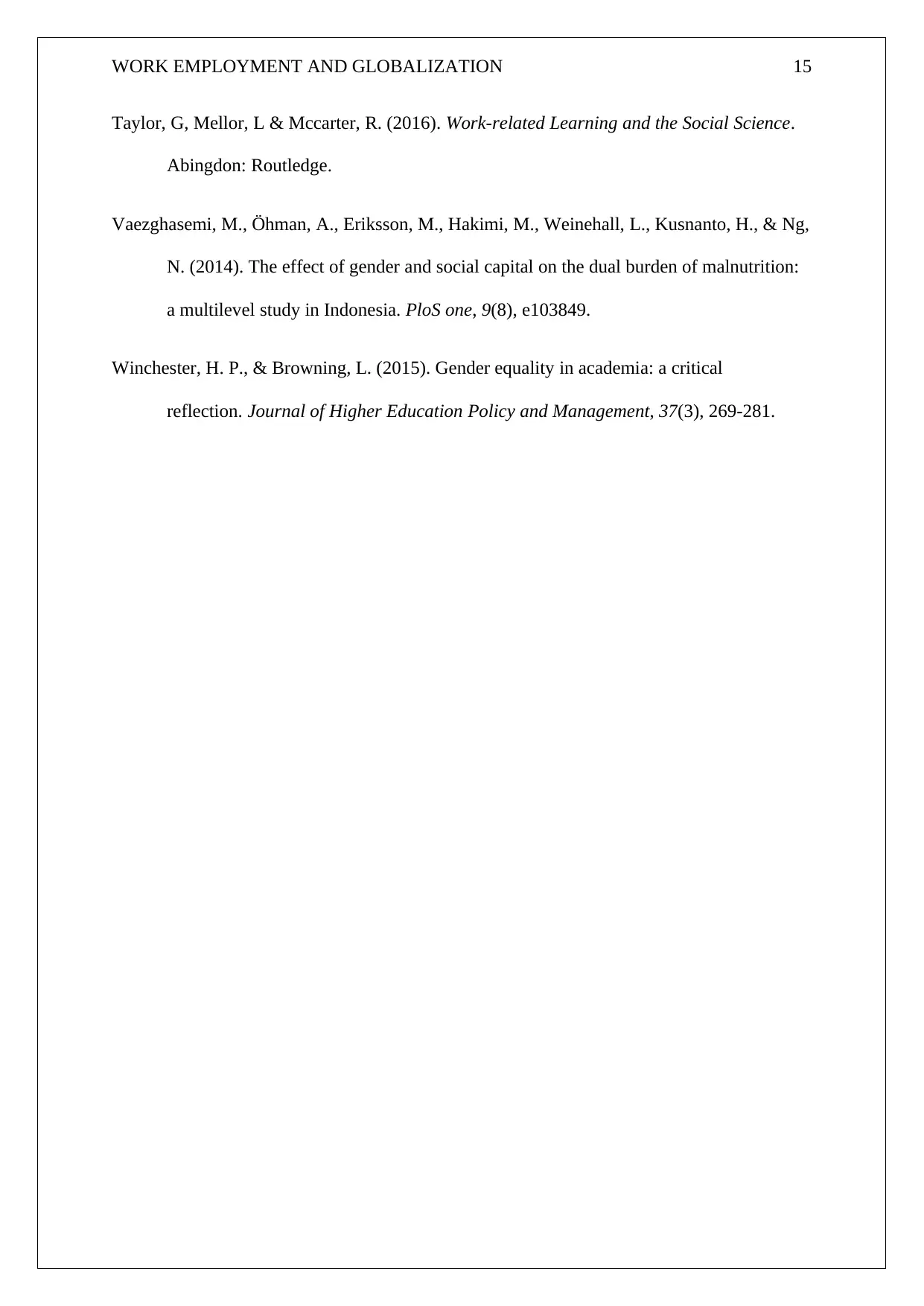
WORK EMPLOYMENT AND GLOBALIZATION 15
Taylor, G, Mellor, L & Mccarter, R. (2016). Work-related Learning and the Social Science.
Abingdon: Routledge.
Vaezghasemi, M., Öhman, A., Eriksson, M., Hakimi, M., Weinehall, L., Kusnanto, H., & Ng,
N. (2014). The effect of gender and social capital on the dual burden of malnutrition:
a multilevel study in Indonesia. PloS one, 9(8), e103849.
Winchester, H. P., & Browning, L. (2015). Gender equality in academia: a critical
reflection. Journal of Higher Education Policy and Management, 37(3), 269-281.
Taylor, G, Mellor, L & Mccarter, R. (2016). Work-related Learning and the Social Science.
Abingdon: Routledge.
Vaezghasemi, M., Öhman, A., Eriksson, M., Hakimi, M., Weinehall, L., Kusnanto, H., & Ng,
N. (2014). The effect of gender and social capital on the dual burden of malnutrition:
a multilevel study in Indonesia. PloS one, 9(8), e103849.
Winchester, H. P., & Browning, L. (2015). Gender equality in academia: a critical
reflection. Journal of Higher Education Policy and Management, 37(3), 269-281.
1 out of 15
Related Documents
Your All-in-One AI-Powered Toolkit for Academic Success.
+13062052269
info@desklib.com
Available 24*7 on WhatsApp / Email
![[object Object]](/_next/static/media/star-bottom.7253800d.svg)
Unlock your academic potential
© 2024 | Zucol Services PVT LTD | All rights reserved.





